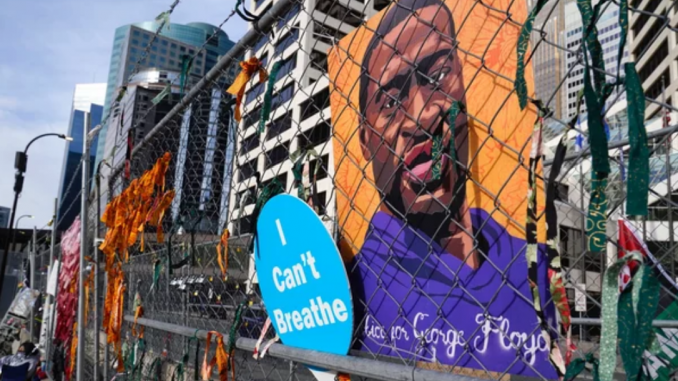
The trial of George Floyd’s killer, Derek Chauvin, has begun in Minnesota. One would think after he was videoed crushing the life out of Floyd, Chauvin’s conviction would be certain. American history teaches us that may not be the case.
When South Carolina Senator and States’ Rights Party Presidential NomineeStrom Thurmond, one of the most vicious proponents of American racism and white supremacy in 20th-century politics, said in 1948 that neither the laws of Washington nor bayonets of the Army could force Black people into “our homes, our schools, our churches,” he was continuing a longstanding tradition of dehumanizing Black people.
The Democratic Party nominated Harry Truman for president in 1948 on a platform featuring a prominent civil rights plank. Thurmond proclaimed Truman’s federal anti-lynching and anti-poll tax initiatives (one of the post-Reconstruction measures designed to destroy the Black vote) were “oppressive” and threatened to destroy the South’s “way of life.”
Of course, federal legislation was needed because some white people in the South had long pulled double duty as political officials, civil servants, police officers … and killers. Too many times, Black people were lynched and white officials (who were involved in the killings or knew the perpetrators) told grieving Black families and communities their loved ones had met their ends at the hands of “persons unknown.”
Put simply, people like Thurmond believed, among other things, that white people should be able to kill Black people at will without repercussions. They agreed with the words of United States Supreme Court Chief Justice Roger B. Taney in the 1857 Dred Scott decision that Black people “had no rights which the white man was bound to respect.” Taney reaffirmed Black people were never intended to be American citizens. What he didn’t say ran even deeper — the barbaric treatment of them could be justified because many white Americans did not even regard them as human.
You may like:What’s behind the idiotic bill making it illegal to insult the police? Racism, of course
In 1829, Black abolitionist David Walker published “An Appeal to the Coloured Citizens of the World.” Walker’s “Appeal” took positions in defense of Black humanity considered jarring at the time. Among them, he disputed the long-held European social and religious belief that Black people were a lower form of life cursed by God to serve their white masters.
To the contrary, Walker argued God was actually on the side of the oppressed and Black people should not passively serve, but resist. He wrote, “They want us for their slaves, and think nothing of murdering us. Therefore, if there is an attempt made on us, kill or be killed. And believe this, that it is no more harm for you to kill a man who is trying to kill you than it is for you to take a drink of water when thirsty.”
Walker’s pamphlet was banned throughout the South. Officials in Georgia even put a price on Walker’s head. They would give $10,000 to anyone handing him over alive, and $,1000 to anyone bringing him in dead.
Less than a year after the “Appeal’s” publication, Walker was dead. Some believe he succumbed to tuberculosis. Others argue he was poisoned. We will never know the truth. No matter what led to Walker’s death, Black suffering and dehumanization did not end with slavery in 1865, it simply insidiously morphed.
Eighty years after David Walker’s death, the NAACP and Urban League were founded to continue the fight for equality. The organizations often had offices next door to one another. One thing they feverishly fought against was lynching, which escalated to dizzying levels to keep Black people in fear and under control after slavery.
As a warning, the NAACP would fly a flag proclaiming, “A Man was Lynched Yesterday” outside its New York headquarters alerting communities that another Black person had been murdered. Such flags are still hoisted around the country after the murders of George Floyd and others.
This continues to be necessary because a symbiotic system is still in place running from police to politicians that ceaselessly justify the oppression, dehumanization and state-sponsored murder of Black people. Many still do not see the snuffing out of the lives of Black men, women and children as great losses.
“Dixiecrats” left the Democratic convention and organized a separate States’ Rights Party in 1948 and nominated Thurmond for president. Harry Truman won and the Dixiecrats were never at ease in the Democratic Party again. Many of them, including Thurmond, eventually bolted for the GOP because they saw it as developing into a political machine more in line with their ideologies.
Many of today’s Republicans are the political descendants of the Dixiecrats and continue to draw racial blood with their views on everything from history to education to politics to policing.
Finally, we must remember all death isn’t of the physical sort. Some killings are political, softer and subtler.
A few days before Chauvin’s trial began, Georgia Republican Governor Brian Kemp signed a highly controversial bill into law many believe negatively affects Black voting in the same state that put a bounty on David Walker 190 years ago. It was pushed by Republican legislators after unprecedented black turnout helped elect the state’s first Black senator in January. Kemp signed it while seated in front of a painting of a Georgia slave plantation.
Yes, George Floyd is dead — lynched before our eyes … and some people think that’s just fine because they still don’t see Black as citizens or fully human. Let’s hope none of them are on the jury.
*story by The Courier-Journal